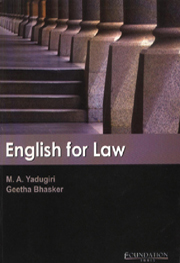Book contents
- Frontmatter
- Preface
- Contents
- A Note to the Student
- Notes to the Teacher
- 1 Nature of Law
- 2 Crimes and Civil Wrongs
- 3 Command of Language in the Profession of the Law
- 4 Plain Language and the Law
- 5 The Indian Constitution
- 6 The Impact of Technology on the Practice of Law
- 7 The International Court of Justice
- 8 Application of Precedents
- 9 Statutory Interpretation
- 10 Legal Reasoning
- 11 Plaints and Writs
- 12 Judgment
- 13 Of Defamation
- 14 Consumer Protection (Amendment) Act, 1993
- 15 The Information Technology Act, 2000
- 16 Universal Declaration of Human Rights
- Answer Key
6 - The Impact of Technology on the Practice of Law
Published online by Cambridge University Press: 26 October 2011
- Frontmatter
- Preface
- Contents
- A Note to the Student
- Notes to the Teacher
- 1 Nature of Law
- 2 Crimes and Civil Wrongs
- 3 Command of Language in the Profession of the Law
- 4 Plain Language and the Law
- 5 The Indian Constitution
- 6 The Impact of Technology on the Practice of Law
- 7 The International Court of Justice
- 8 Application of Precedents
- 9 Statutory Interpretation
- 10 Legal Reasoning
- 11 Plaints and Writs
- 12 Judgment
- 13 Of Defamation
- 14 Consumer Protection (Amendment) Act, 1993
- 15 The Information Technology Act, 2000
- 16 Universal Declaration of Human Rights
- Answer Key
Summary
What does the future hold for a practising lawyer? While predicting the future is always risky; it is extremely likely that the lawyer of 2010 will be using technology to perform many of the tasks now performed manually or by assistants, and some lawyers are using technology now in every aspect of their practice. This article will focus on the impact of technology and the Internet on communications, legal research and dispute resolution in cyberspace, since the most far-reaching and challenging changes are occurring in the way that lawyers connect with clients and each other over the Internet. It is a safe bet, however, that technology will bring, in the next 20 years, far-reaching changes in the other areas of law practice affected by it. For instance, lawyers of the future will use technology to market their practices on the Internet, will continue to use smaller and smaller computers to practise law, will create documents using computers and document processing technology, will continue to automate the financial accounting and billing functions, and many other topics beyond the space constraints of this article. What technology is doing to our profession, and how we will use technology to make ourselves better lawyers, and have fun doing it, are subjects that can fill many volumes, and are as broad as the practice of law itself.
- Type
- Chapter
- Information
- English for Law , pp. 170 - 219Publisher: Foundation BooksPrint publication year: 2005



